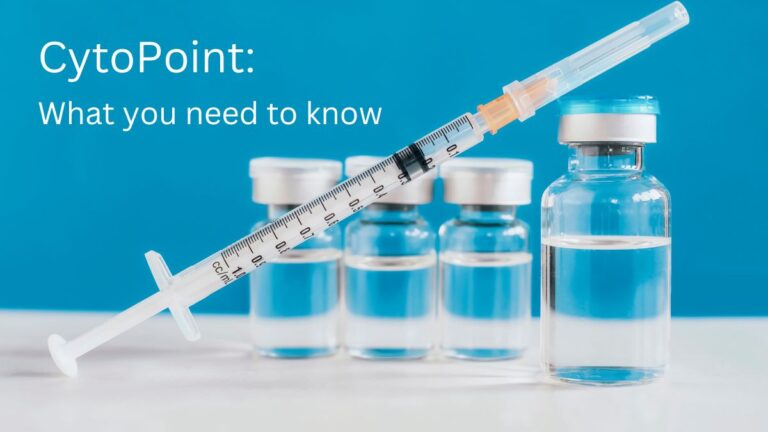Cytopoint has become an increasingly popular treatment for managing allergic dermatitis and other skin conditions in dogs. By targeting and neutralizing interleukin-31 (IL-31), a protein involved in itching and inflammation, Cytopoint offers effective relief to dogs suffering from severe itching caused by allergies. While the treatment has shown great promise, like any medication, Cytopoint side effects and potential health risks must be carefully considered. In this article, we will explore the known side effects of Cytopoint, provide expert insights on its use, and discuss any potential health risks associated with the treatment.
What Is Cytopoint?
Cytopoint is a monoclonal antibody designed to specifically target IL-31, a cytokine responsible for initiating the intense itching response in dogs with atopic dermatitis and other allergic conditions. It is administered through an injection, and it provides long-term relief, typically for 4–8 weeks, after which a new injection may be required. Cytopoint works by preventing IL-31 from binding to receptors in nerve cells, thereby reducing itching and inflammation.
This treatment is widely used in veterinary practices to help dogs with chronic skin conditions caused by allergies, including flea allergy dermatitis, food allergies, and environmental allergies. Cytopoint has proven to be a valuable addition to veterinary dermatology and is generally well-tolerated by dogs. However, as with all treatments, there are potential Cytopoint side effects that pet owners should be aware of.
Known Cytopoint Side Effects
While Cytopoint is effective for many dogs, it is essential to be aware of the possible side effects. The most common side effects associated with Cytopoint are generally mild and transient. Below, we discuss the most frequently reported side effects:
1. Gastrointestinal Issues
Some dogs may experience mild gastrointestinal issues, including vomiting or diarrhea, after receiving a Cytopoint injection. These side effects are typically short-lived and resolve within a few days. Gastrointestinal upset is relatively uncommon but may occur as the dog’s system adjusts to the medication.
2. Lethargy and Decreased Activity
A small number of dogs may show signs of lethargy or decreased activity following a Cytopoint injection. This can manifest as a lack of interest in play, less enthusiasm for walks, or general fatigue. These symptoms generally resolve within a few days, and the dog returns to its normal energy levels once the body adjusts to the treatment.
3. Injection Site Reactions
Mild reactions at the injection site, such as swelling or tenderness, are possible after Cytopoint administration. These reactions typically resolve on their own within a few hours to a few days. In rare cases, more severe reactions may occur, but they are uncommon.
4. Allergic Reactions
Although rare, some dogs may develop allergic reactions to Cytopoint. Signs of an allergic reaction include itching, swelling, hives, or difficulty breathing. If any of these symptoms are observed after an injection, the dog should receive immediate veterinary attention. Severe allergic reactions are uncommon but possible with any type of medication.
5. Changes in Appetite
Changes in appetite are another potential side effect of Cytopoint. Some dogs may show a decreased or increased appetite in the days following the injection. While these changes are typically temporary, it’s important to monitor your dog’s food and water intake and contact your veterinarian if any persistent issues occur.
6. Skin Conditions
In some cases, Cytopoint may cause temporary flare-ups of skin conditions such as rash or irritation. While Cytopoint is designed to treat allergic skin conditions, individual reactions can vary. These reactions are usually mild and should resolve on their own, but ongoing issues should be discussed with your vet.
Serious Side Effects and Health Risks
Though rare, Cytopoint side effects can sometimes be more serious. It’s important to be vigilant and monitor your dog for any signs of complications after receiving the injection. Here are some of the more serious health risks, though they are not commonly reported:
1. Immune System Suppression
As Cytopoint is an immunomodulatory drug, it can influence the immune system. In theory, the medication could cause a suppression of the immune response, which could make the dog more susceptible to infections. This risk is typically minimal, but owners should be cautious if their dog has a history of recurrent infections or immune system disorders.
2. Potential for Overreaction to Allergens
Although Cytopoint works to reduce allergic reactions by targeting IL-31, there is a possibility that some dogs may experience an overreaction to environmental allergens, particularly if they are exposed to a significant amount of allergens shortly after receiving the injection. This could lead to symptoms such as increased itching, skin irritation, or swelling.
3. Rare Neurological Issues
In very rare cases, dogs may experience neurological side effects such as seizures or tremors following a Cytopoint injection. These side effects have not been commonly reported in clinical studies, but they should not be ruled out entirely. If your dog exhibits abnormal neurological symptoms, it is important to seek immediate veterinary care.
Who Should Avoid Cytopoint?
While Cytopoint is safe for many dogs, there are certain situations where it may not be the best option:
- Puppies Under 8 Weeks of Age: Cytopoint is not recommended for puppies under 8 weeks of age, as there is insufficient data regarding its safety for very young dogs.
- Pregnant or Lactating Dogs: As with many medications, Cytopoint should be used cautiously or avoided in pregnant or lactating dogs. Consult with your veterinarian if your dog is pregnant or nursing before proceeding with treatment.
- Dogs with Known Allergies to Monoclonal Antibodies: If your dog has shown signs of an allergic reaction to monoclonal antibodies in the past, Cytopoint may not be suitable. Always inform your veterinarian of any known allergies to ensure the best treatment approach.
Cytopoint vs. Other Allergy Treatments for Dogs
When considering Cytopoint side effects, it’s important to compare it with other allergy treatments available for dogs. Traditional treatments for atopic dermatitis and allergic reactions in dogs include corticosteroids (like prednisone), antihistamines, and other immunosuppressive therapies. Each of these treatments comes with its own set of potential side effects:
- Corticosteroids: These medications can have significant long-term side effects, including weight gain, increased thirst, and a weakened immune system. They are effective at controlling inflammation, but they are often not the first choice for chronic treatment due to these risks.
- Antihistamines: While antihistamines are generally well-tolerated, they may not be as effective for severe itching or inflammation and can cause drowsiness or gastrointestinal upset in some dogs.
Cytopoint has a targeted mechanism of action, which is why it is often preferred for dogs with chronic allergies that do not respond well to other treatments. Its safety profile makes it a more favorable option compared to corticosteroids for long-term use.
Conclusion
Cytopoint side effects are generally mild and transient, with gastrointestinal upset, lethargy, and injection site reactions being the most commonly reported issues. Serious side effects, such as immune suppression or neurological symptoms, are rare but can occur. As with any medication, it’s crucial to monitor your dog closely after treatment and consult your veterinarian if any unusual symptoms arise.
Overall, Cytopoint offers a targeted and effective solution for managing allergic dermatitis and other skin conditions in dogs, especially those that have not responded well to traditional treatments. When used appropriately and under veterinary guidance, it can significantly improve your dog’s quality of life without the major risks associated with other medications.
FAQs
- What are the common side effects of Cytopoint?
Common side effects include mild gastrointestinal upset, lethargy, and injection site reactions, such as swelling or tenderness. - Can Cytopoint cause long-term health issues?
Long-term issues are rare, but there is a possibility of immune suppression, which may increase susceptibility to infections. - Is Cytopoint safe for puppies?
Cytopoint is not recommended for puppies under 8 weeks of age due to insufficient safety data for very young dogs. - Can Cytopoint cause allergic reactions?
While rare, allergic reactions to Cytopoint can occur, with symptoms like swelling, itching, or difficulty breathing. Seek veterinary attention immediately if these occur. - How often do dogs need Cytopoint injections?
Cytopoint injections are typically administered every 4–8 weeks, depending on the severity of the dog’s symptoms. - What should I do if my dog experiences side effects from Cytopoint?
If you notice side effects, consult your veterinarian immediately to determine if adjustments to the treatment plan are necessary.







